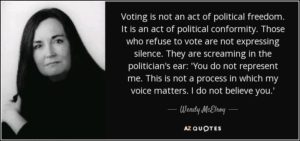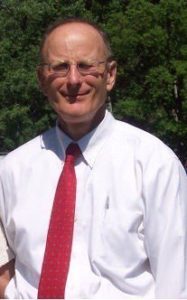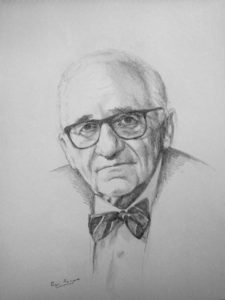Voluntaryism: Some Personal Reminiscences
By Wendy McElroy
1982 seems like a century ago, but some memories are fresh. One summer afternoon, Carl Watner, George H. Smith, and I created a movement. Or, more accurately, we revived and redefined a movement under a name we knew from reading 19th century British libertarian history. George explained that opponents of state-funded, compulsory education called themselves ‘voluntaryists’ – a term popularized by Auberon Herbert, a disciple of Herbert Spencer. We never imagined that Voluntaryism would become such a vigorous presence within the modern-day freedom community, however.

The meeting occurred during one of Carl’s visits to the apartment in Hollywood, California, that George and I shared. It lasted a few hours, with Carl and I sitting on the couch that pulled out to form Carl’s bed at night, while George spent much of the time pacing in front of us. Afterward, we dropped by a nearby coffee shop for dinner, where conversation continued unabated. Many radical movements have probably sprung from similarly humble beginnings, but it didn’t feel humble to me. I remember my fingertips were tingling – literally tingling – during part of the discussion; George had a restless energy, and Carl was smiling far more than usual. Voluntaryism felt electric then; it feels electric now.
But I am ahead of myself already.
What is Voluntaryism? The political philosophy was and is based on the non-aggression principle. That description is inadequate, however, because it does not distinguish Voluntaryism from mainstream libertarianism. The distinction: Voluntaryism identifies electoral politics as a form of aggression and advocates the use of non-political strategies instead. It returns to the spirit of 19th century American libertarianism, which was both profoundly anti-political and passionate about practical paths to freedom. (More on this shortly.)
The timing for an anti- and non-political movement was perfect. The Libertarian Party had been founded in 1971 and, following the 1980 federal elections, it became the third largest party in the U.S. Especially in New York and California, it spread rapidly. Formerly “hard core” anarchists started to join the LP – Murray Rothbard among them. They began to argue that voting, campaigning for politicians, and even holding office were the best ways to achieve a stateless society. Suddenly, anti-statists argued passionately for the state … as long as libertarians held the reins of power. The non-political anarchists were soon called silly dreamers, whose ideas of removing the state from our lives were impractical.
There was backlash against the LP, of course. Unfortunately, much of it was either ineffective or counterproductive. Samuel E. Konkin III (SEK3) – the originator of agorism – was loudly consistent in his attacks, but he and his associates could be strident and could sound unreasonable. For example, they descended on supper clubs and heckled libertarians who were running for political office. Robert LeFevre was a far better communicator, but his philosophy included a pacifism that many, if not most, people found to be unpalatable.

Carl, George, and I realized that a comprehensive, integrated rebuttal was necessary to counter what might become a turning point in the movement; that is, a turn toward electoral politics. More than a simple anti-state manifesto was required. Our advocacy of Voluntaryism had to present a clear and positive vision of how freedom would emerge from peaceful interactions. We needed to address modern issues through that filter, while, at the same time, presenting the history of how everything from hard money to customary law originated from people voluntarily interacting, not from governmental bureaucracy. We had to demonstrate how the state could be abandoned, and show how history was replete with examples of voluntary institutions that offered the services usually provided by the state.
The statement of purpose for Voluntaryism reads, “The Voluntaryists are libertarians who have organized to promote non-political strategies to achieve a free society. We reject electoral politics, in theory and in practice, as incompatible with libertarian goals. Governments must cloak their actions in an aura of moral legitimacy in order to sustain their power, and political methods invariably strengthen that legitimacy. Voluntaryists seek instead to delegitimize the state through education, and we advocate withdrawal of the cooperation and tacit consent on which state power ultimately depends.”
If I were to change the statement today, I would insert a sentence to emphasize the need for alternative paths to freedom.

The three of us had different strengths with which to approach the challenge of founding a movement. We were a good blend. This was evident from the first issue of THE VOLUNTARYIST which was published in October 1982. The feature article was “The Ethics of Voting” (Part 1 of an eventual three-part article) by George. It reflected his more theoretical bent and confrontational style. My contribution was the editorial “Neither Ballots Nor Bullets,” which was heavily influenced in both content and style by my research into the 19th century American individualist anarchists. Carl was more sophisticated about nonviolent resistance, having put it into impressive practice within his own life. Carl’s contribution was a book review of Gene Sharp’s remarkable three-volume work, THE POLITICS OF NON-VIOLENT ACTION. This and many other of Sharp’s books were to play an essential role in defining the non-electoral strategies embraced by Voluntaryism.
The libertarian response to Voluntaryism was immediate and divided. Many libertarians were intrigued or enthusiastic, especially because THE VOLUNTARYIST stressed hands-on activism. For example, Issue 5 (April 1983) featured an interview I conducted with Paul Jacob, who had been indicted on September 23, 1982 for failure to register for the draft. He chose to avoid prosecution by “going on the run.” THE VOLUNTARYIST was young, fearless, and filled with ideals. Some prominent figures in the movement, including the charismatic Robert LeFevre, were generous in their support. LeFevre’s article “How to Become a Teacher” appeared in issue 3.
Some responses were not so pleasant. Libertarian ‘politicos’ snickered about the name, claiming the movement was doomed because no one would be able to pronounce the word “Voluntaryism.” Other responses were more bizarre. For example, Murray Rothbard’s response to George’s anti-electoral stand, which seemed to particularly rankle him.
In March 1983, the LIBERTARIAN FORUM ran an article by Murray entitled “The New Menace of Gandhism,” in which he lambasted libertarianism’s recent “non-violence fad.” He explicitly stated his motive for doing so. The “fad” had been “picking off some of the best and most radical Libertarian Party activists, ones which the Party could ill afford to lose if it were to retain its thrust and its principles.” In other words, Voluntaryism was making an impact. And, to his credit, Murray correctly identified the principle of non-violence and the practice of electoral politics as antagonistic forces that could not coexist. He knew an enemy when he saw one.

Murray’s article stated, “The time has come to rip the veil of sanctity that has been carefully wrapped around Gandhi by his numerous disciples, that … greatly inspired the new Voluntaryist movement.” Murray was a good friend of mine. But I must confess, to this day, I do not understand his criticism that Voluntaryism was based on Gandhi. None of us understood it. It was true that a quote from Gandhi headed the newsletter: “If one takes care of the means, the end will take care of itself.” Gandhi was an influence on the Voluntaryists, but so were many other people, such as Benjamin Tucker, Lysander Spooner, Robert LeFevre, and even Murray himself. As I remember, Carl was most influenced by Gandhian philosophy, and I came in second. Why George was singled out for attack when he was the least Gandhian of the Voluntaryists is also something of a mystery. I expect that George’s arguments were proving too persuasive.
I did not escape unscathed, either. At one point, Murray stated, “Smith, McElroy and others deny vehemently either that they are mystics or that they are courting martyrdom. I remain unconvinced.” Again, the accusations were so bizarre that it was difficult even to respond. If I have a regret about Voluntaryism, however, it is this: Murray and I experienced a schism that never quite healed.
It has been a long journey since that first issue of THE VOLUNTARYIST. I will always be proud of being the newsletter’s first editor but, frankly, I don’t remember how it happened. At the planning session for the newsletter, the three of us agreed to a revolving editorship, and the first shift went to me. Perhaps it was chance; perhaps I had available time. Whatever happened, within a few years, the task of editorship fell entirely upon Carl, who has done yeoman’s work in keeping it active and continuous. From time to time, George and I have made “appearances” in THE VOLUNTARYIST, but we have not been involved in its production for many years. Carl is the one who deserves applause for keeping it alive these many years. The fact that there is a Voluntaryist movement today (2018) is evidence of the strength and truth of its ideas and principles.

